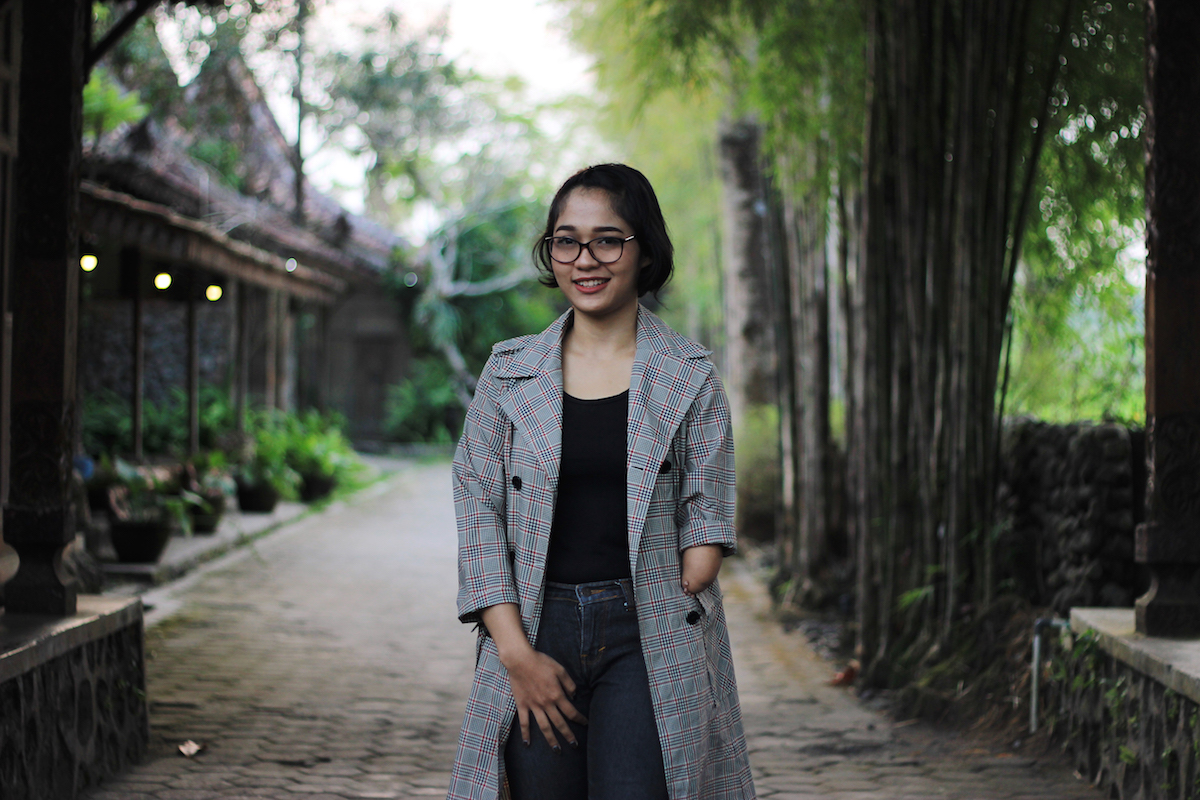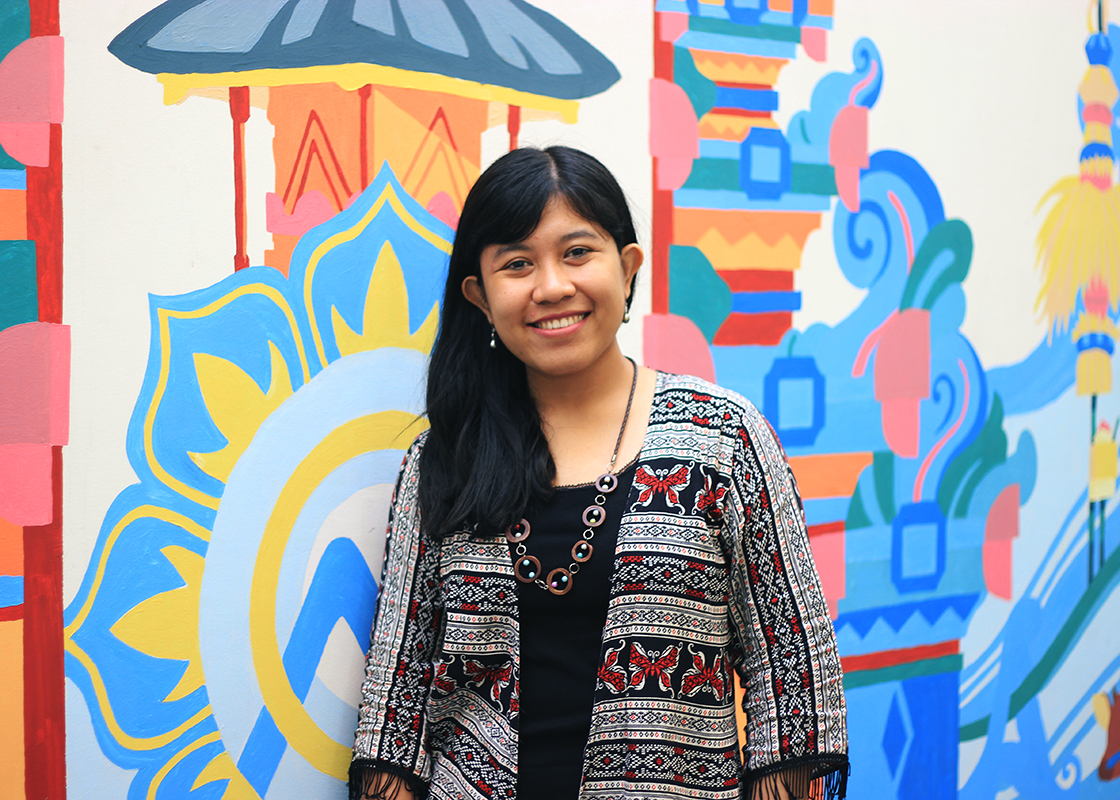Tell us a bit about yourself.
My name is Maria Ivena Amanda, but you can call me Vena. Currently I’m working at a startup called Design for Dream, which aims to empower members of the disabled community through technology and partnerships. I am in charge of the human resources department, managing all of our workforce so that we can work more efficiently and building up a stronger team.
I grew up in a Javanese family, and you know, the stigma towards a family with disabled children is quite strong. There are a lot of people who can’t really accept that their children are disabled, so they tend to hide their children. The worst I’ve heard is that there are people who hit their disabled children in their homes. They’re caged away. It’s because they tend to feel shame from society, since according to traditional views we are considered cursed or diseased. I’ve been mocked as a child because I was different. So it’s quite hard to socialize, especially with people who have that mindset.
My parents sent me to an inclusive school because they didn’t want me to feel depressed. I came back from Pekan Olahraga Pelajar Disabel Nasional (National Sports Week for the Disabled) with a gold medal. And that’s the first time I could see myself more clearly. Back then, I honestly felt ashamed of being disabled and tended to hide my disability. Living that kind of life is not what I want. You know, I don’t want to hide myself. But I’m afraid of being rejected by society. And that is the first time I felt empowered by myself, despite my disability.
In university, I wasn’t really involved in the disabled community because as you can see there are still only few communities. Even within the community, most of the members are not disabled but care a lot about disability issues. And fewer still are organizations built by disabled people themselves or disabled figures in the spotlight.
For a few years after, I joined the feminist organization JAS Associates. They needed translators to evaluate their organization in Indonesia. From this experience, I also learned something about acknowledging my power as a woman. After all, being disabled is difficult enough — being a woman who is disabled is even more difficult. Luckily over the past few years, the expectations are changing. There are a lot more career women out there versus stay-home ones. I don’t know the reality, but in my opinion there are still very few opportunities for us to be able to join a company because our government has the regulation of 1% of the population in their company should be disabled. But the reality isn’t like that, in one company only one or two disabled people can enter. So that there is still a lot of disabled people that can’t even sustained themselves.
Another turning point for me was when I participated in a camp event for disabled people held by the Ministry of Communications, meant to train disabled people on technology use. We were trained for three days to develop skills on things like graphic design and Microsoft Office. So there were a lot of people with physical disabilities. We were grouped together, with one group consisting of different people with different disabilities. One of my teammates suffered from vision impairment. When I asked for his number, he edited his name as “pijet,” or massage therapist. People who have vision impairment tend to become therapists. It’s a stereotype. You can be anything you want, but unfortunately because people have an image of the visually impaired being therapists, they exclude and limit themselves with that belief. With that experience, I came to realize that sometimes disability is created in our own minds. We limit ourselves because we think that we can’t, even though we haven’t tried it yet. But we already think that we cannot.
These realizations made me feel like I had to do something. And as psychology student, I have to use my knowledge to fix this situation.
What challenges do you face as a woman who is disabled?
I mentioned before that in Indonesia is difficult enough, but being a woman who is disabled is even harder. The first challenge is self acceptance. As a Javanese woman, I am told to lower myself towards men. But as a woman who is disabled, I was already lowering my pride; being disabled just adds to it. It connected to my self esteem as a woman, and I feel like it’s quite difficult to socialize. I mentioned earlier that the stigma of disability is still negative in our society.
Another challenge is education. I think there are a lot of women out there – especially women with disabilities – who have limited access to education. Like when their family is ashamed of their children they tend to hide themselves so they can’t have access to education.
How did you personally overcome those challenges?
It’s quite a terrifying process; I constantly have internal battles with myself. It’s like an endless doubt, like, “You can’t do this, you can’t do this, you can’t do this,” but at the same time, “I have to, I have to, I have to.” And then I realized that I didn’t want to live this way. I don’t want to seek social acceptance from external sources.
I am also watching some of motivational videos in youtube on Helen Keller or Frida Kahlo. They’re women, they may have their own difficulty but they won’t give up on their dream. So I want to be like that in my best version of course.
For those disabled women who struggle with challenges such as education and opportunity, what does society need to do to support them?
Well first of all, it’s educational access. In Indonesia, there are still very few inclusive educational institutions. Maybe in the most urban areas like Jakarta and Yogyakarta, there are fewer problems in terms of facilities and access. But in rural areas, there are many. So I think that it is better for the government or people concerned about this issue to create more inclusive and accessible educational environments. Access is important because I cannot ride a motorcycle or car. And when we ask for a driver’s license, the procedure is quite long for us. Thankfully today we have GO-JEK, so it makes our lives easier. But if we depend on government transportation, it’s quite hard for us to mobilize.
What are some ways the disabled community is breaking glass ceilings and shattering boundaries?
As I mentioned earlier, we need more disabled people who are successful at exceeding their own limitations. With the growth of social media (like Instagram and Facebook), we’re seeing more of these. In Indonesia, there is a huge growth of influencer; I’m quite happy with that because there are new faces. For instance, the disabled model Angky Yudistia. She’s a model with a hearing impairment. On Youtube, there is Surya Satehapi. He is also an activist for hearing impairment. Some people with vision impairment, they tend to have a podcast. But there are still not as many figures who have physical impairments, like myself, in the spotlight. So I’m dedicating myself to be one in the future.
In Design for Dream, I am learning to become a model for our product. I remember back then when I felt afraid or ashamed of my body. Now I have to embrace it as a model of Design for Dream. I think that in the future I can share this with my fellow friends with disability: That you can be anything. You don’t have to be a masseuse or a tailor or a beggar. You can do something or create something while sustaining yourself. You can even make social impact.
There’re aren’t many in the disabled community that are entrepreneurs yet. In many ways, you’re one of the pioneers. How is that like?
It’s an amazing feeling. I guess this is my chance to tell other women that, “I was able to do entrepreneurial things, so maybe you can do it, too.”
What’s something exciting that your startup is doing now?
My startup is initiating our first project to empower a disabled organization, Binasiwi. They make batik and we help them not only sell their product but also how to advertise and create a good brand image. We increase the social recognition of their product, their community, and their activities, as well as the people in the community and their artworks. They can draw very well, so I want them to believe that their art is something that can be appreciated by spreading their artwork.
What’s your goal five to ten years down the line?
I want to make my startup company more successful and have a great social impact. I want to help as many disabled as I can, and possibly do a TED talk. That’s one of my dreams: to share my story and tell people that, “You are loved and appreciated enough, so get your ass up and do something!”
Do you have any message to tell other girls that want to be in the startup or entrepreneur’s space?
Of course. First of all, I’m so proud of you girls. I’m so proud of you. With your story, we have to spread more to our sisters who may still be being locked away by their minds or by society. We have to tell them that, “We can do something,” like, “We can create something and we can become something,” even when society tells us we cannot, but we can.
I think it’s a great move to make our society more inclusive, because being a disabled person does not lessen you as a person. Our disability shouldn’t limit our ability to succeed, because “normal” people tend to underestimate our abilities due to our disabilities. But I want to break that stereotype to show myself that I can become great and continuously develop as a person. And I want to encourage my sisters to do the same and to love yourselves and spread that love to everyone else.

